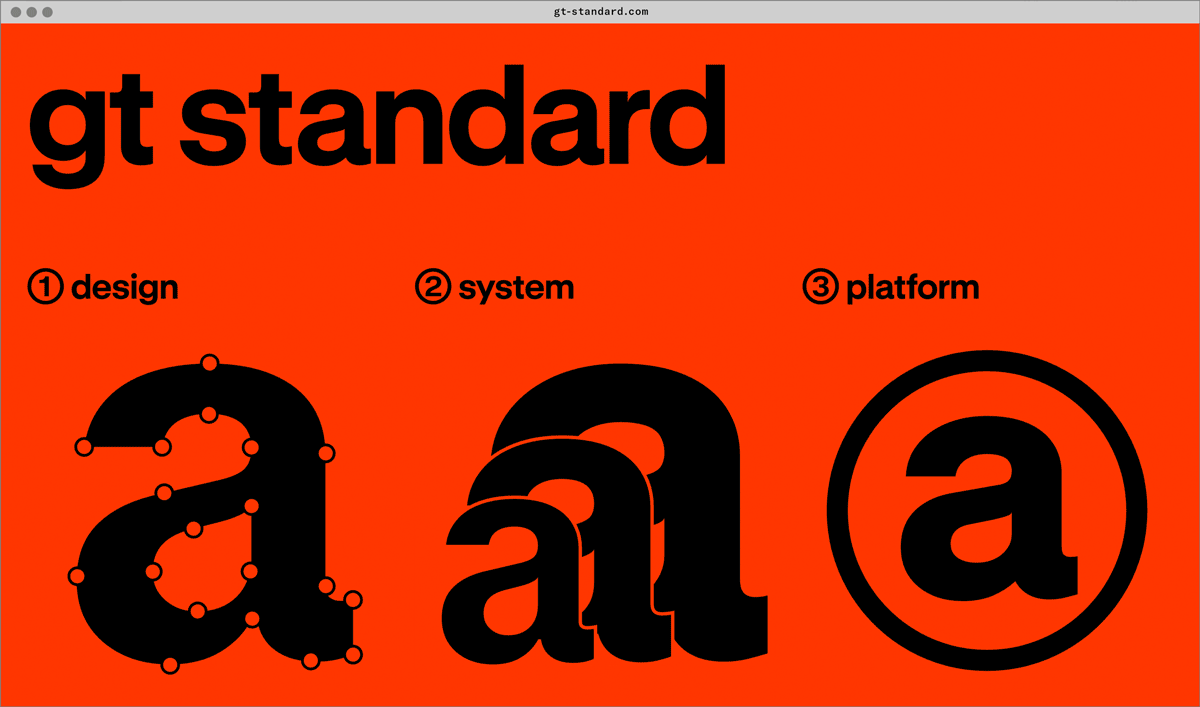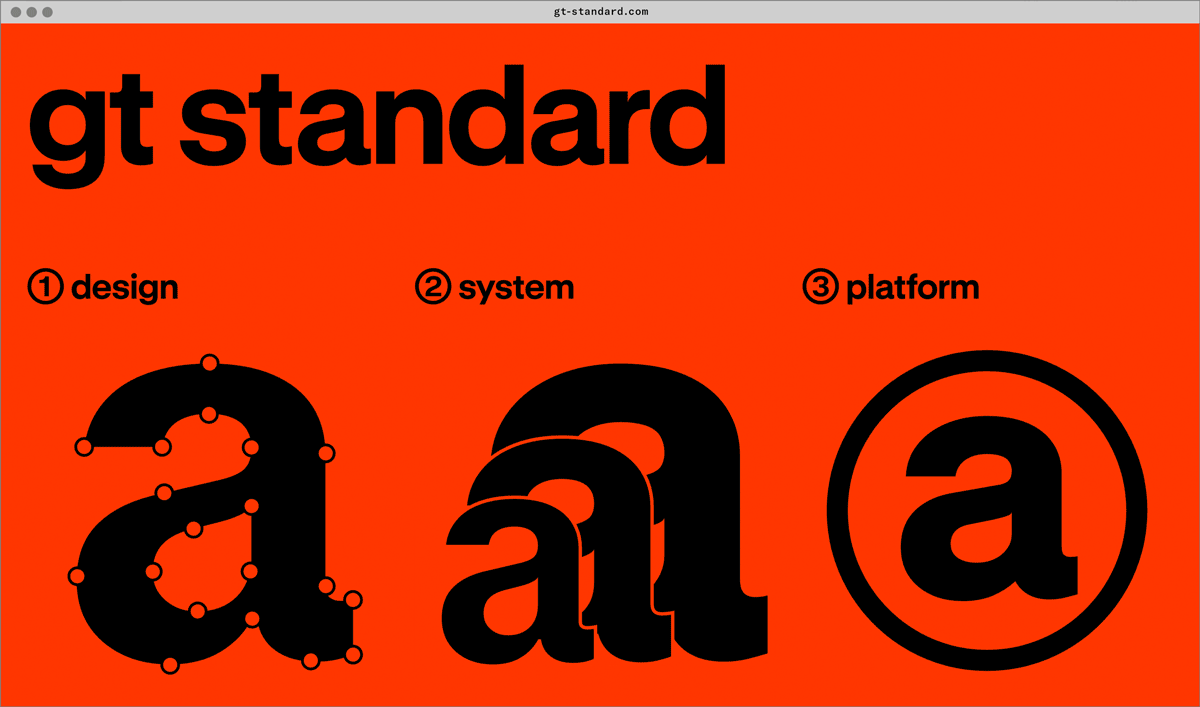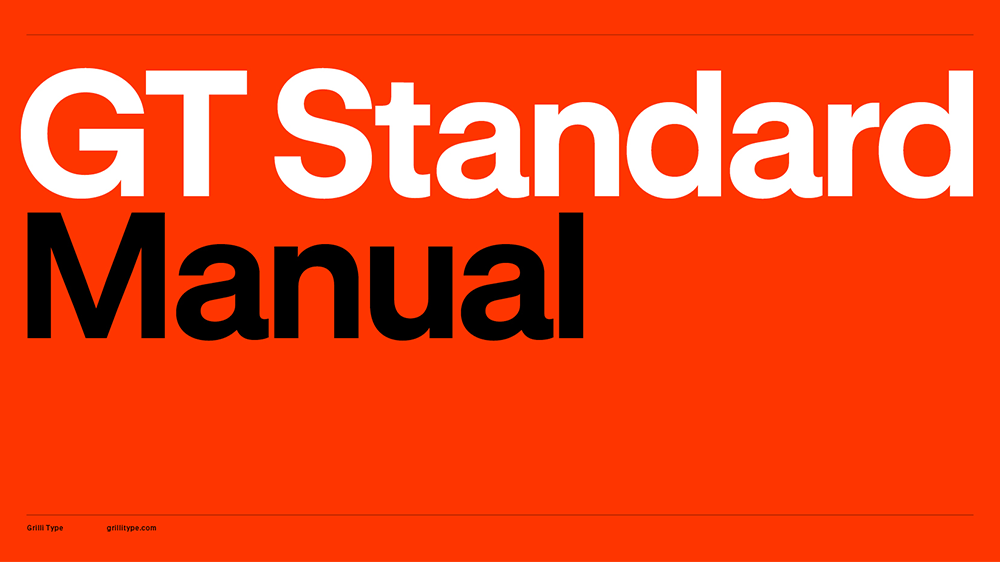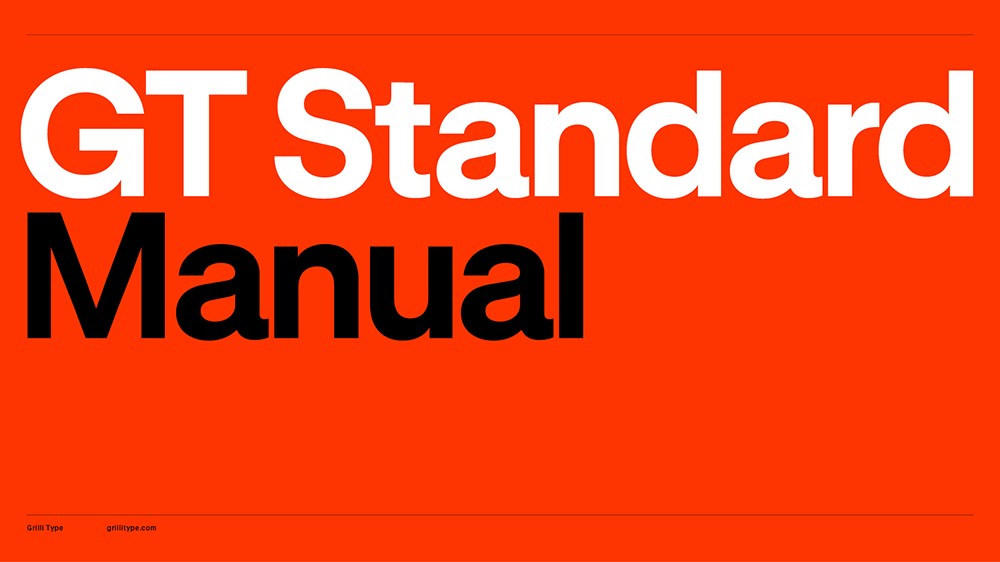GT Standard
Family overview
- Compressed
- S Light Oblique
- M Light Oblique
- L Light Oblique
- S Regular Oblique
- M Regular Oblique
- L Regular Oblique
- S Medium Oblique
- M Medium Oblique
- L Medium Oblique
- S Semibold Oblique
- M Semibold Oblique
- L Semibold Oblique
- S Bold Oblique
- M Bold Oblique
- L Bold Oblique
- S Heavy Oblique
- M Heavy Oblique
- L Heavy Oblique
- S Black Oblique
- M Black Oblique
- L Black Oblique
- Condensed
- S Light Oblique
- M Light Oblique
- L Light Oblique
- S Regular Oblique
- M Regular Oblique
- L Regular Oblique
- S Medium Oblique
- M Medium Oblique
- L Medium Oblique
- S Semibold Oblique
- M Semibold Oblique
- L Semibold Oblique
- S Bold Oblique
- M Bold Oblique
- L Bold Oblique
- S Heavy Oblique
- M Heavy Oblique
- L Heavy Oblique
- S Black Oblique
- M Black Oblique
- L Black Oblique
- Narrow
- S Light Oblique
- M Light Oblique
- L Light Oblique
- S Regular Oblique
- M Regular Oblique
- L Regular Oblique
- S Medium Oblique
- M Medium Oblique
- L Medium Oblique
- S Semibold Oblique
- M Semibold Oblique
- L Semibold Oblique
- S Bold Oblique
- M Bold Oblique
- L Bold Oblique
- S Heavy Oblique
- M Heavy Oblique
- L Heavy Oblique
- S Black Oblique
- M Black Oblique
- L Black Oblique
- Standard
- S Light Oblique
- M Light Oblique
- L Light Oblique
- S Regular Oblique
- M Regular Oblique
- L Regular Oblique
- S Medium Oblique
- M Medium Oblique
- L Medium Oblique
- S Semibold Oblique
- M Semibold Oblique
- L Semibold Oblique
- S Bold Oblique
- M Bold Oblique
- L Bold Oblique
- S Heavy Oblique
- M Heavy Oblique
- L Heavy Oblique
- S Black Oblique
- M Black Oblique
- L Black Oblique
- Extended
- S Light Oblique
- M Light Oblique
- L Light Oblique
- S Regular Oblique
- M Regular Oblique
- L Regular Oblique
- S Medium Oblique
- M Medium Oblique
- L Medium Oblique
- S Semibold Oblique
- M Semibold Oblique
- L Semibold Oblique
- S Bold Oblique
- M Bold Oblique
- L Bold Oblique
- S Heavy Oblique
- M Heavy Oblique
- L Heavy Oblique
- S Black Oblique
- M Black Oblique
- L Black Oblique
- Expanded
- Mono Compressed
- Light Oblique
- Regular Oblique
- Medium Oblique
- Semibold Oblique
- Bold Oblique
- Heavy Oblique
- Black Oblique
- Mono Condensed
- Light Oblique
- Regular Oblique
- Medium Oblique
- Semibold Oblique
- Bold Oblique
- Heavy Oblique
- Black Oblique
- Mono Narrow
- Light Oblique
- Regular Oblique
- Medium Oblique
- Semibold Oblique
- Bold Oblique
- Heavy Oblique
- Black Oblique
- Mono Standard
- Light Oblique
- Regular Oblique
- Medium Oblique
- Semibold Oblique
- Bold Oblique
- Heavy Oblique
- Black Oblique
- Mono Extended
- Light Oblique
- Regular Oblique
- Medium Oblique
- Semibold Oblique
- Bold Oblique
- Heavy Oblique
- Black Oblique
- Mono Expanded
Subfamilies
- Standard S LightTechnical standards are defined as Government standards, which are standards developed by the government for its own uses.
- Standard M LightTeX typesetting system, commonly used in creating scientific articles and reports for publication (in fact many journals require the publication to be fully written in TeX)
- Standard L LightWith the Acrobat Reader program available for free, and continued support of the format, PDF eventually became the de facto standard for printable documents. In 2005, PDF/A became a de jure standard as ISO 19005-1:2005.[4] In 2008 Adobe's PDF 1.7 became ISO 32000-1:2008.
- Standard S Light ObliqueCommunication protocols such as Morse code and USB are standards that allow different machines and people to communicate.
- Standard M Light ObliqueIn contrast, a custom, convention, company product, corporate standard, and so forth that becomes generally accepted and dominant is often called a de facto standard.
- Standard L Light ObliqueWith the Acrobat Reader program available for free, and continued support of the format, PDF eventually became the de facto standard for printable documents. In 2005, PDF/A became a de jure standard as ISO 19005-1:2005.[4] In 2008 Adobe's PDF 1.7 became ISO 32000-1:2008.
- Standard S RegularUse of programming languages R and Python in science and engineering disciplines, other than computer science, where automated analysis of data is required, while remaining simple enough for a non-professional.
- Standard M RegularIn social sciences, including economics, a standard is useful if it is a solution to a coordination problem: it emerges from situations in which all parties realize mutual gains, but only by making mutually consistent decisions.
- Standard L RegularThe MP3 audio format started as an alternative to WAV for internet music distribution, then replaced it. It is now supported by the vast majority of music players, audio transport, audio storage, and non-commercial media.
- Standard S Regular ObliqueThere are many different standards in many fields of daily life. Standards are important so that correct comparisons can be produced.
- Standard M Regular ObliquePCI Express electrical and mechanical interface, and interconnect protocol used in computers, servers, and industrial applications.
- Standard L Regular ObliqueStandard units, in physics and applied mathematics, are commonly accepted measurements of physical quantities.
- Standard S MediumPrivate standards typically require a financial contribution in terms of an annual fee from the organizations who adopt the standard. Corporations are encouraged to join the board of governance of the standard owner.
- Standard M MediumA standard test method describes a definitive procedure that produces a test result. It may involve making a careful personal observation or conducting a highly technical measurement.
- Standard L MediumStandard units, in physics and applied mathematics, are commonly accepted measurements of physical quantities.
- Standard S Medium ObliquePhone connector (3.5 mm jack), RCA and XLR connectors, used in the audio industry for connecting audio equipment such as headphones, mixing desks, microphones, stage lighting, etc.
- Standard M Medium ObliqueA de facto standard is a custom or convention that is commonly used even though its use is not required. De facto is a Latin phrase meaning in practice but not necessarily ordained by law, or in practice or actuality, but not officially established.
- Standard L Medium ObliqueDMX512 (commonly just DMX) with XLR connector to control and sometimes power stage and venue lights, effects, smoke machines, laser projectors, and pyrotechnics.
- Standard S SemiboldA standard specification is an explicit set of requirements for an item, material, component, system or service. It is often used to formalize the technical aspects of a procurement agreement or contract.
- Standard M SemiboldFor example, a physical property of a material is often affected by the precise method of testing: any reference to the property should therefore reference the test method used.
- Standard L SemiboldA standard practice or procedure gives a set of instructions for performing operations or functions. For example, there are detailed standard operating procedures for operation of a nuclear power plant.
- Standard S Semibold ObliqueWith the Acrobat Reader program available for free, and continued support of the format, PDF eventually became the de facto standard for printable documents. In 2005, PDF/A became a de jure standard as ISO 19005-1:2005.[4] In 2008 Adobe's PDF 1.7 became ISO 32000-1:2008.
- Standard M Semibold ObliqueANSI was most likely formed in 1918, when five engineering societies and three government agencies founded the American Engineering Standards Committee (AESC).
- Standard L Semibold ObliqueTechnical standards may exist as published documents available for purchase or private documents owned by an organization or corporation, used and circulated as the owner determines necessary or useful
- Standard S BoldWith the Acrobat Reader program available for free, and continued support of the format, PDF eventually became the de facto standard for printable documents. In 2005, PDF/A became a de jure standard as ISO 19005-1:2005.[4] In 2008 Adobe's PDF 1.7 became ISO 32000-1:2008.
- Standard M BoldStandard units, in physics and applied mathematics, are commonly accepted measurements of physical quantities.
- Standard L BoldThese standards ensure that the characteristics and performance of products are consistent, that people use the same definitions and terms, and that products are tested the same way.
- Standard S Bold Oblique2.54 mm (0.1 inch) pin spacing on many electronic components, including DIP, SIL packages, header connectors, and many more. The standard spacing enable use of these devices in prototyping boards and standardized sockets.
- Standard M Bold ObliqueANSI was most likely formed in 1918, when five engineering societies and three government agencies founded the American Engineering Standards Committee (AESC).
- Standard L Bold ObliqueDMX512 (commonly just DMX) with XLR connector to control and sometimes power stage and venue lights, effects, smoke machines, laser projectors, and pyrotechnics.
- Standard S HeavyStandards organizations often have more diverse input and usually develop voluntary standards: these might become mandatory if adopted by a government (i.e., through legislation), business contract, etc.
- Standard M HeavyAccording to Adam Stanton, the first permanent secretary and head of staff in 1919, AESC started as an ambitious program and little else. Staff for the first year consisted of one executive, Clifford B. LePage, who was on loan from a founding member, ASME.
- Standard L HeavyMicrosoft Word DOC. Due to the market dominance of Word, it is supported by all office applications that intend to compete with it, typically by reverse engineering the undocumented file format.
- Standard S Heavy ObliqueDMX512 (commonly just DMX) with XLR connector to control and sometimes power stage and venue lights, effects, smoke machines, laser projectors, and pyrotechnics.
- Standard M Heavy ObliqueFor example, a physical property of a material is often affected by the precise method of testing: any reference to the property should therefore reference the test method used.
- Standard L Heavy ObliqueIt is usually a formal document that establishes uniform engineering or technical criteria, methods, processes, and practices.
- Standard S BlackThere are many different standards in many fields of daily life. Standards are important so that correct comparisons can be produced.
- Standard M BlackThe American National Standards Institute is a private nonprofit organization that oversees the development of voluntary consensus standards for products, services, processes, systems, and personnel in the United States.
- Standard L BlackTechnical standards may exist as public documents on the internet, public library, etc. Some technical standards may be found at a major central library or at the library of a good technical university
- Standard S Black ObliquePrivate standards typically require a financial contribution in terms of an annual fee from the organizations who adopt the standard. Corporations are encouraged to join the board of governance of the standard owner.
- Standard M Black ObliqueThe ANSI/APSP (Association of Pool & Spa Professionals) standards used for pools, spas, hot tubs, barriers, and suction entrapment avoidance.
- Standard L Black ObliqueAlthough ANSI itself does not develop standards, the Institute oversees the development and use of standards by accrediting the procedures of standards developing organizations.
- Settings
Typeface information
GT Standard is a contemporary response to the modernist pursuit of standardization. It’s rooted in the principles of Swiss Style and expands on this legacy to meet the needs of today’s visual landscape. The typeface is systematic yet expressive, built for clarity, adaptability, and precision across every scale and medium.
Typeface features
OpenType features enable smart typography. You can use these features in most Desktop applications, on the web, and in your mobile apps. Each typeface contains different features. Below are the most important features included in GT Standard’s fonts:
- SS01
- Alternate a
Regards
- SS02
- Alternate g
Engaging
- SS03
- Alternate y
Energy
- SS04
- Alternate Q
Quality
- SS06
- Rectangular Dots
Minimalism
- SS07
- Account Spoofing
Informal
Typeface Minisite


- Visit the GT Standard minisite to discover more about the typeface family’s history and design concept.

